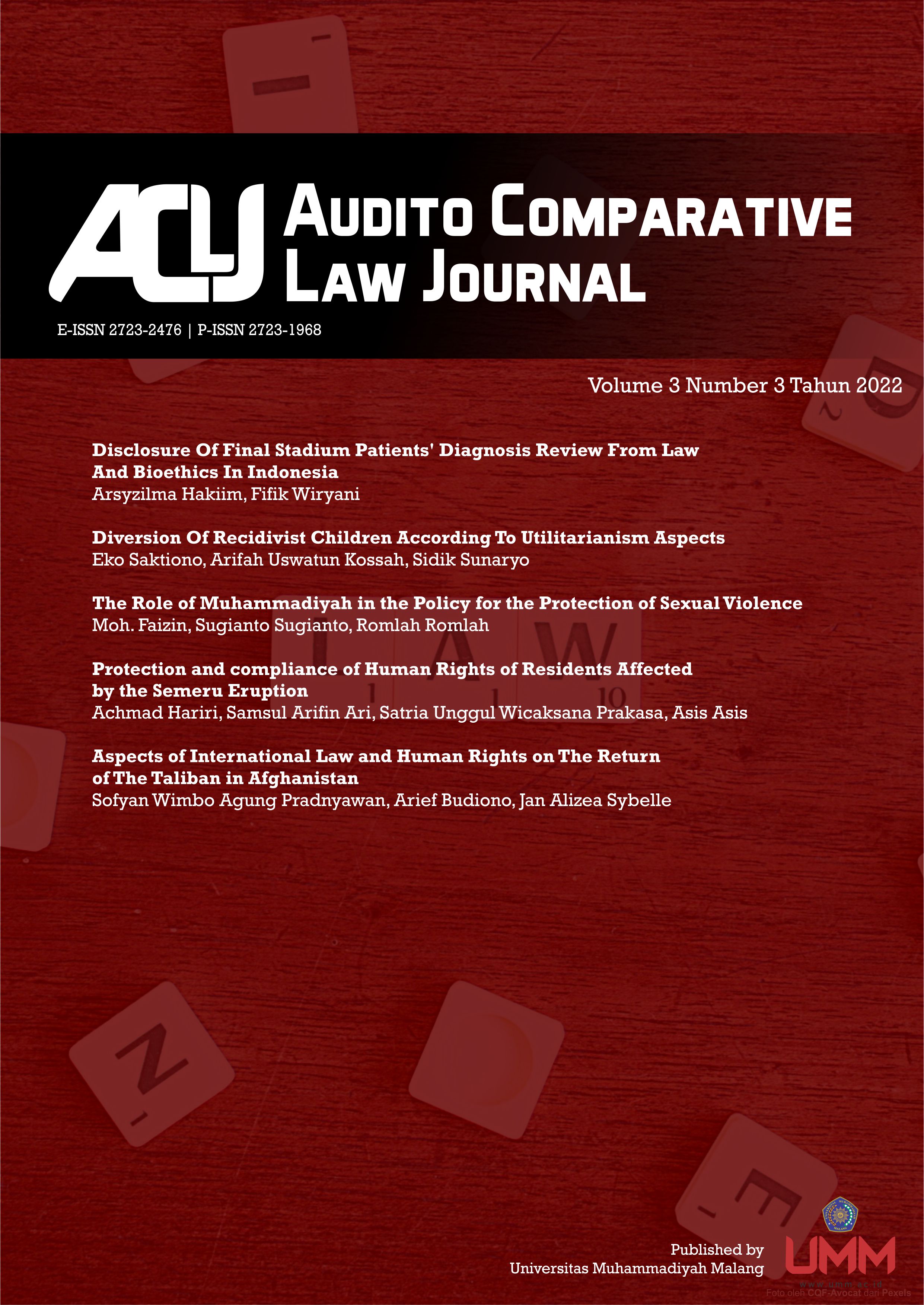Diversion Of Recidivist Children According To Utilitarianism Aspects
DOI:
https://doi.org/10.22219/aclj.v3i3.21681Keywords:
Child, Recidivist, Diversi, UtilitarianismAbstract
In an act against legal norms, especially criminal law, children must be treated differently from adults. This is because children are a group of naturally weak people children who commit crimes should be lighter than those adults through what is known as restorative justice and Diversion (Indonesian law says it “Diversi”). However, then, Article 7 paragraph (2) of the Juvenile Criminal Justice System Law (Indonesian: UU SPPA), basically states that Diversi is only carried out if the criminal penalty for the act is less than 7 (seven) years and is not a repetition of a crime. Utilitarianism or Utilism puts benefit as the main goal of Benefit here is defined as happiness. So, good or bad or fair or not a law depends on whether the law gives happiness to humans or not. Through a normative juridical study that emphasizes the review of laws and literature studies, the authors find that a utilitarian review of Diversi to recidivist children is very likely to produce broad benefits for many people and has the potential to close the possibility of recidivist children committing criminal acts again. This is because, in Diversi, the benefits of overcoming the consequences of children's actions can be felt by the perpetrator's child, the victim, and their respective families through mutual agreement. In line with that, the principles of implementing the SPPA Law confirm that children must be addressed especially for the protection of their growth and development and to eliminate discrimination that differentiates the process between one child and another. It is hoped that with this literature review, legal products regarding juvenile justice can participate in guaranteeing the rights of recidivism children in Diversi as a method of overcoming crime by children.
Downloads
References
Abeth, H. J. (2017). Restorative Justice Sebagai Langkah Menuju Penegakan Hukum Pidana Modern Dan Berkelanjutan. Jurnal Ilmu Hukum “THE JURIS,” 1(2), 129.
Aji, W. S. (2019). The Implementation of Diversion and Restorative Justice in the Juvenile Criminal Justice System in Indonesia. Journal of Indonesian Legal Studies, 4(1), 73–88. https://doi.org/10.15294/jils.v4i01.23339
Ali, A. (2009). Menguak Teori Hukum (Legal Theory) Dan Teori Peradilan (Judicialprudence) Termasuk Interpretasi Undang-Undang (Legisprudence). Jakarta: Kencana.
Aulia, F., & Al-Fatih, S. (2017). Perbandingan Sistem Hukum Common Law, Civil Law dan Islamic Law dalam Perspektif Sejarah dan Karakteristik Berpikir . Legality : Jurnal Ilmiah Hukum, 25(1), 98–113. Retrieved from http://202.52.52.22/index.php/legality/article/view/5993
Bentham, J. (1984). An Introduction to the Principles of Morals and Legislation. New York: Hafner Publishing Co.
Buchanan, A., & Mathieu, D. (1986). Philosophy and Justice BT - Justice: Views from the Social Sciences (R. L. Cohen, ed.). https://doi.org/10.1007/978-1-4899-3511-3_2
BURNS, J. H. (2005). Happiness and Utility: Jeremy Bentham’s Equation. Utilitas, 17(1), 46–61. https://doi.org/DOI: 10.1017/S0953820804001396
Christians, C. G. (2007). Utilitarianism in Media Ethics and Its Discontents. Journal of Mass Media Ethics, 22(2–3), 113–131. https://doi.org/10.1080/08900520701315640
Cragg, W. (2003). The practice of punishment: Towards a theory of restorative justice. The Practice of Punishment: Towards a Theory of Restorative Justice, 1–214. https://doi.org/10.4324/9780203406823/PRACTICE-PUNISHMENT-WESLEY-CRAGG
Darmodiharjo. (1995). Produk-produk Filsafat Hukum: Apa dan Bagaimana Filsafat Hukum Indonesia. Jakarta: Gramdida Pustaka Utama.
DIPA RUDIANA, I. N., & RAI SETIABUDHI, I. K. (2021). Reconstruction of the Diversion Concept in a Child Criminal Jurisdiction System Based on Dignified Justice. PRIZREN SOCIAL SCIENCE JOURNAL, 5(1), 104–112. https://doi.org/10.32936/pssj.v5i1.210
Dwijayanti, M. (2017). Diversi Terhadap Recidive Anak. Rechtidee, 12(2), 223–244. https://doi.org/10.21107/ri.v12i2.3244
Erdianti, R. N., & Al-Fatih, S. (2019a). Fostering as an Alternative Sanction for Juveniles in the Perspective of Child Protection in Indonesia. JILS (Journal of Indonesian Legal Studies), 4(1), 119–128. https://doi.org/10.15294/JILS.V4I01.29315
Erdianti, R. N., & Al-Fatih, S. (2019b). Mewujudkan Desa Layak Anak Sebagai Bentuk Perlindungan Hukum Terhadap Anak Di Indonesia. Justitia Jurnal Hukum, 3(2), 305–318. Retrieved from http://journal.um-surabaya.ac.id/index.php/Justitia/article/view/3648/2361
Hariyanto, E. (2019). INTERRELASI PEMBANGUNAN HUKUM DAN POLITIK MENUJU TATANAN KEHIDUPAN MASYARAKAT MODERN DAN DEMOKRATIS. AL-IHKAM: Jurnal Hukum & Pranata Sosial, 1(1), 97–111. https://doi.org/10.19105/al-lhkam.v1i1.2555
Hernawarman, K., & Santiago, F. (2022). Regulation of Child Criminal Action Through Diversion in the Child Criminal System. Proceedings of the First Multidiscipline International Conference, MIC 2021, October 30 2021, Jakarta, Indonesia. https://doi.org/10.4108/eai.30-10-2021.2315736
Jatnika, D. C., Mulyana, N., & Raharjo, S. T. (2016). RESIDIVIS ANAK SEBAGAI AKIBAT DARI RENDAHNYA KESIAPAN ANAK DIDIK LEMBAGA PEMASYARAKATAN DALAM MENGHADAPI PROSES INTEGRASI KE DALAM MASYARAKAT. Prosiding Penelitian Dan Pengabdian Kepada Masyarakat, 3(2). https://doi.org/10.24198/jppm.v3i2.13691
Komariah, K., & Cahyani, T. (2016). EFEKTIFITAS KONSEP DIVERSI DALAM PROSES PERADILAN ANAK PELAKU TINDAK PIDANA MENURUT UU NO. 11 TAHUN 2012 TENTANG SISTEM PERADILAN PIDANA ANAK. Legality: Jurnal Ilmiah Hukum, 24(2).
Lubis, M. R., & Putra, P. S. (2021). PEMIDANAAN TERHADAP ANAK YANG BERHADAPAN DENGAN HUKUM. JURNAL USM LAW REVIEW, 4(1), 226. https://doi.org/10.26623/julr.v4i1.3354
May, J., Osmond, K., & Billick, S. (2014). Juvenile Delinquency Treatment and Prevention: A Literature Review. Psychiatric Quarterly, 85(3), 295–301. https://doi.org/10.1007/s11126-014-9296-4
Moeljatno. (2008). Asas-Asas Hukum Pidana (Edisi Revisi). Jakarta: Rineka Cipta.
Muchsin. (2011). Perlindungan Anak Dalam Prespektif Hukum Positif (Tinjauan Hukum Administrasi Negara, Hukum Perdata, dan Hukum Pidana). In Varia Peradilan Tahun XXVI No. 308 Juli 2011 (p. 23). Jakarta: IKAHI.
Muhadar, A. . S. and M. (2013). Filsafat Hukum (Teori dan Praktif). Jakarta: Kencana.
Rismanto, R. (2021). The Process Of Settlement Of Criminal Actions With Children Through Approach Restorative Justice. Veteran Justice Journal, 2(2), 142–156. https://doi.org/10.33005/vjj.v2i2.43
Rosidah, N. (2012). Pembaharuan Ide Diversi Dalam Implementasi Sistem Peradilan Anak Di Indonesia. Undip: Masalah-Masalah Hukum Journal, 41(2), 182. https://doi.org/https://doi.org/10.14710/mmh.41.2.2012.179-188
Satria, H. (2018). RESTORATIVE JUSTICE: PARADIGMA BARU PERADILAN PIDANA. Jurnal Media Hukum, 25(1), 113. https://doi.org/10.18196/jmh.2018.0107.111-123
Seiter, R. P., & Kadela, K. R. (2003). Prisoner Reentry: What Works, What Does Not, and What Is Promising. Crime & Delinquency, 49(3), 360–388. https://doi.org/10.1177/0011128703049003002
Setyowati, D. (2020). Diversion in the Child Criminal Justice System as an Effort to Implement Restorative Justice. Unram Law Review, 4(1), 64–73. https://doi.org/10.29303/ulrev.v4i1.108
Soetojode, W. (2007). Hukum Pidana Anak. Bandung: Refka Aditama.
Usman, A. H. (2015). Kesadaran hukum masyarakat dan pemerintah sebagai faktor tegaknya negara hukum di Indonesia. Jurnal Wawasan Yuridika, 30(1), 26–53.
Downloads
Published
How to Cite
Issue
Section
License
Copyright (c) 2022 Eko Saktiono, Arifah Uswatun Kossah, Sidik Sunaryo

This work is licensed under a Creative Commons Attribution-ShareAlike 4.0 International License.








